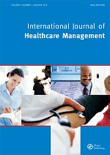
International Journal of Healthcare Management
Scope & Guideline
Bridging theory and practice in health policy and leadership.
Introduction
Aims and Scopes
- Healthcare Quality Improvement:
Research focused on improving healthcare quality through various methodologies, including quality assurance, patient safety initiatives, and accreditation processes. - Healthcare Policy and Management:
Exploration of healthcare policies, management strategies, and organizational behavior that impact healthcare delivery systems and patient outcomes. - Patient Experience and Satisfaction:
Studies that assess patient perceptions and satisfaction with healthcare services, aiming to identify factors that enhance or detract from positive patient experiences. - Healthcare Workforce Management:
Investigations into the dynamics of healthcare workforce management, including staffing, job satisfaction, retention, and the impacts of workplace conditions on healthcare professionals. - Technological Innovations in Healthcare:
Analysis of the role of technology in healthcare settings, including telemedicine, health information systems, and innovations that improve service delivery and patient outcomes. - Economic Evaluation in Healthcare:
Research that evaluates the economic aspects of healthcare interventions, including cost-effectiveness analyses and assessments of healthcare expenditures. - Public Health and Community Health Services:
Research addressing public health challenges, community health initiatives, and the implications of social determinants of health on healthcare access and outcomes.
Trending and Emerging
- Impact of COVID-19 on Healthcare Systems:
Significant attention is being given to the effects of the COVID-19 pandemic on healthcare systems, including operational challenges, workforce management, and adaptations in service delivery. - Digital Health and Telemedicine:
The rise of digital health technologies and telemedicine has become a focal point, with research exploring their implementation, effectiveness, and impact on patient care and access. - Healthcare Equity and Access:
There is a growing emphasis on studies addressing healthcare disparities, social determinants of health, and strategies to improve access to care for underserved populations. - Patient-Centered Care Models:
Emerging research is increasingly focused on patient-centered care approaches, emphasizing shared decision-making, personalized care, and the importance of patient engagement in healthcare delivery. - Healthcare Workforce Well-Being:
Research on healthcare workforce well-being, including topics such as burnout, job satisfaction, and retention strategies, is gaining prominence as organizations seek to support their staff in challenging environments. - Sustainability in Healthcare:
An increasing number of studies are exploring sustainability initiatives within healthcare organizations, focusing on environmental impacts, resource management, and the integration of sustainable practices in healthcare delivery.
Declining or Waning
- Traditional Healthcare Models:
Research focused on traditional healthcare delivery models has seen a decline as the journal shifts towards innovative and integrated approaches that emphasize patient-centered care and value-based healthcare. - Pharmaceutical Marketing Strategies:
There has been a noticeable decrease in studies specifically targeting pharmaceutical marketing strategies, possibly due to the increasing emphasis on patient-centric approaches and direct-to-consumer health communication. - Clinical Guidelines and Protocols:
While clinical guidelines remain important, the frequency of research focusing solely on the development and implementation of clinical protocols has waned, potentially overshadowed by broader systemic healthcare management issues. - Healthcare Facility Operations:
Research concentrating exclusively on operational aspects of healthcare facilities is declining, as the field increasingly embraces holistic frameworks that integrate patient experience, technology, and management practices.
Similar Journals

Journal of Patient Experience
Advancing knowledge, enhancing patient care.Journal of Patient Experience, published by SAGE Publications Inc, serves as a vital resource in the realms of Health Policy, Health (Social Science), and Leadership and Management. This open-access journal, established in 2014, is dedicated to enhancing the understanding of patient experiences and its implications on healthcare delivery and outcomes. With an impressive impact factor indicative of its scholarly significance and a current category quartile ranking of Q2 across multiple disciplines, it plays a crucial role in disseminating innovative research that informs policy and practice. The journal is indexed in Scopus, further affirming its contributions within the social sciences and healthcare sectors. It aims to foster interdisciplinary collaboration among researchers, healthcare professionals, and students, driving the conversation toward meaningful improvements in patient care. Its continued commitment to excellence makes it an essential read for anyone invested in the future of healthcare.

AMERICAN JOURNAL OF MANAGED CARE
Advancing managed care knowledge for improved outcomes.AMERICAN JOURNAL OF MANAGED CARE is a premier peer-reviewed journal dedicated to the dissemination of research and insights in the fields of health policy and managed care. Published by Managed Care & Healthcare Communications LLC, this esteemed journal has been instrumental in shaping discussions on healthcare management and policy since its inception in 1996. With a 2023 classification in the first quartile (Q1) for both Health Policy and Medicine (miscellaneous), it stands as a significant resource for researchers, professionals, and students seeking to stay at the forefront of healthcare advancements. While this journal does not offer open access, it provides essential content that influences policy formulation and clinical practices across the United States and beyond. With a robust impact factor and a strategic focus on evidence-based methodologies, the AMERICAN JOURNAL OF MANAGED CARE remains committed to fostering a deeper understanding of managed care systems and improving healthcare delivery.

Family Medicine and Community Health
Empowering communities with evidence-based practices.Family Medicine and Community Health, published by the BMJ PUBLISHING GROUP, is a leading journal dedicated to advancing research and practice in the fields of family medicine and public health. With an impact factor placing it in the Q1 quartile for both Family Practice and Public Health, this journal is indispensable for researchers, clinicians, and policymakers aiming to shape healthcare practices effectively. Since becoming Open Access in 2013, it has prioritized the dissemination of high-quality, peer-reviewed articles to a global audience, ensuring that knowledge is accessible to all. The journal’s rigorous selection process has established its reputation, reflected in its exceptional Scopus rankings—ranked #3 out of 56 in Family Practice and #42 out of 665 in Public Health. By fostering dialogue among healthcare professionals and academic researchers, Family Medicine and Community Health plays a critical role in addressing contemporary health challenges and promoting community-oriented healthcare solutions.

NURSING ECONOMICS
Exploring the Intersection of Nursing and Healthcare Economics.Nursing Economics, published by Jannetti Publications, Inc, is a significant peer-reviewed journal that serves the nuanced intersection of healthcare economics and nursing. Operating under ISSN 0746-1739, this esteemed journal has been instrumental in advancing knowledge within the nursing profession since its inception in 1983, although its coverage was discontinued in Scopus as of 2021. With a focus on innovative research and practical applications, Nursing Economics addresses key issues in leadership and management within the nursing field, holding a Q3 quartile ranking in both Leadership and Management and Medicine (miscellaneous) as of 2023. Its Scopus rank within nursing leadership and management indicates a respectable position among its peers, demonstrating its relevance and contribution to the professional discourse. Researchers, practitioners, and students alike will find valuable insights and evidence-based perspectives that aim to enhance the practice and study of nursing economics in today’s evolving healthcare landscape.
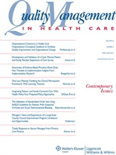
Quality Management in Health Care
Transforming healthcare through excellence in management.Quality Management in Health Care is a revered peer-reviewed journal published by Lippincott Williams & Wilkins, dedicated to advancing the understanding and implementation of quality management principles within the healthcare sector. With an ISSN of 1063-8628 and E-ISSN 1550-5154, this journal has established its reputation through the dissemination of rigorous research and innovative practices that address critical issues in care planning, health policy, and leadership management. The journal is ranked in the Q3 quartile across multiple categories, including Care Planning and Health Policy, demonstrating its significance in the evolving landscape of health management. Although it does not currently offer Open Access options, its blend of theoretical and practical insights makes it an essential resource for researchers, healthcare professionals, and students keen on enhancing quality and effectiveness in health services. This journal continues to play a vital role in shaping best practices and fostering a culture of quality excellence in healthcare, aligning with its objective to refine organizational practices and improve patient outcomes.
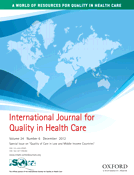
INTERNATIONAL JOURNAL FOR QUALITY IN HEALTH CARE
Fostering excellence in health care quality globally.INTERNATIONAL JOURNAL FOR QUALITY IN HEALTH CARE, published by Oxford University Press, stands as a pivotal resource in the domains of Health Policy, Medicine, and Public Health. With an ISSN of 1353-4505 and an E-ISSN of 1464-3677, this journal has been a cornerstone for quality assessment in healthcare since its inception in 1989, evolving through to 2024. Holding a respected position in the academic community, it is classified in the Q2 category across multiple fields including Health Policy and Environmental Health, reflecting its significant impact as evidenced by its Scopus rankings (Rank #74/310 in Health Policy, Percentile 76th). Though it operates under a subscription model, the journal aims to disseminate pioneering research aimed at improving healthcare quality globally, providing insights that are invaluable for researchers, practitioners, and policymakers alike. With a commitment to enhancing public health landscapes, the journal continues to influence practices and outcomes in a rapidly changing health environment.
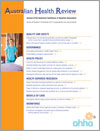
Australian Health Review
Elevating Insights for Health Policy InnovationAustralian Health Review is a prestigious peer-reviewed journal published by CSIRO PUBLISHING, focusing on the dynamic field of health policy. Established in 1980, this journal has continuously evolved to address contemporary health challenges in Australia and beyond, showcasing research that informs policy decisions and enhances health care delivery. With an impressive Q2 ranking in the sector of Health Policy and a Scopus rank of #162 out of 310, it holds a significant position in the academic community, offering vital insights to researchers, practitioners, and educators alike. Although not an open-access journal, it provides valuable research contributions that advance the discourse in health policy and practice. Located at UNIPARK, BUILDING 1, LEVEL 1, 195 WELLINGTON RD, LOCKED BAG 10, CLAYTON, VIC 3168, AUSTRALIA, the journal's comprehensive scope spans from 1980 to 2024, reflecting on the evolving landscape of health research. By disseminating high-quality studies, the Australian Health Review continues to play an essential role in shaping health policy and improving health outcomes.
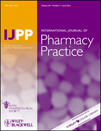
INTERNATIONAL JOURNAL OF PHARMACY PRACTICE
Fostering knowledge for a healthier tomorrow in pharmacy.INTERNATIONAL JOURNAL OF PHARMACY PRACTICE is a distinguished peer-reviewed journal published by Oxford University Press that has been serving the pharmacy and healthcare community since 1991. With the ISSN 0961-7671 and E-ISSN 2042-7174, the journal aims to advance the field of pharmacy practice through the dissemination of high-quality research and innovative practices. The journal is recognized for its impactful contributions, holding a Q1 status in Pharmacy and laying within the Q2 to Q3 quartiles across various health-related categories in 2023, underscoring its commitment to excellence. It occupies a notable position within Scopus rankings, most prominently within the Health Professions: Pharmacy category, where it ranks 12th out of 45 journals, reflecting its relevance and significance in the field. Scholars and practitioners benefit from the journal's rich repository of knowledge that encompasses diverse topics, including pharmaceutical sciences and health policy, supporting the development and enhancement of pharmacy practices worldwide. Although it is not an open-access journal, it continues to be a crucial resource for professionals and academics seeking to stay at the forefront of pharmacy practice advancements.

Asia Pacific Journal of Health Management
Elevating Health Insights Across the Asia-PacificAsia Pacific Journal of Health Management is a distinguished open-access journal published by the Australian College of Health Service Management. Since its inception in 2006, this journal has become an essential resource for researchers, practitioners, and students in the fields of health policy, public health, and health information management. With a commitment to disseminating high-quality research, it operates from Australia, serving as a platform for innovative studies and discussions that address contemporary issues in health management across the Asia-Pacific region. The journal is indexed in Scopus, holding a rank of #228 in Health Policy and #499 in Public Health, indicative of its growing impact, although classified in the Q4 quartile for several categories in 2023. This positions the journal as a valuable resource for understanding health challenges and management practices, promoting a comprehensive understanding of health systems within diverse contexts. Whether you are a seasoned researcher or an emerging scholar, the Asia Pacific Journal of Health Management offers a vital outlet for sharing insights that advance the discipline and improve health outcomes.
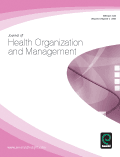
Journal of Health Organization and Management
Advancing health management through research and innovation.The Journal of Health Organization and Management, published by Emerald Group Publishing Ltd, serves as a pivotal resource for professionals, researchers, and students interested in the intersection of health policy and organizational effectiveness. With an ISSN of 1477-7266 and an E-ISSN of 1758-7247, this esteemed journal has been charting advancements in health management since 2003, showcasing articles that reflect rigorous research and the latest trends in the field. Hailing from the United Kingdom, the journal has established itself within the upper echelons of academic literature, currently enjoying a Q2 classification in notable categories, including Business, Management, and Accounting, Health Policy, and Organizational Behavior and Human Resource Management, as of 2023. With impressive rankings in Scopus, including a percentile rank in the 62nd for Business and Management, it is an essential platform for disseminating innovative ideas and evidence-based findings crucial for enhancing health care systems globally. While it operates under a conventional access model, the journal remains dedicated to fostering scholarly dialogue and advancing the understanding of health organization complexities.